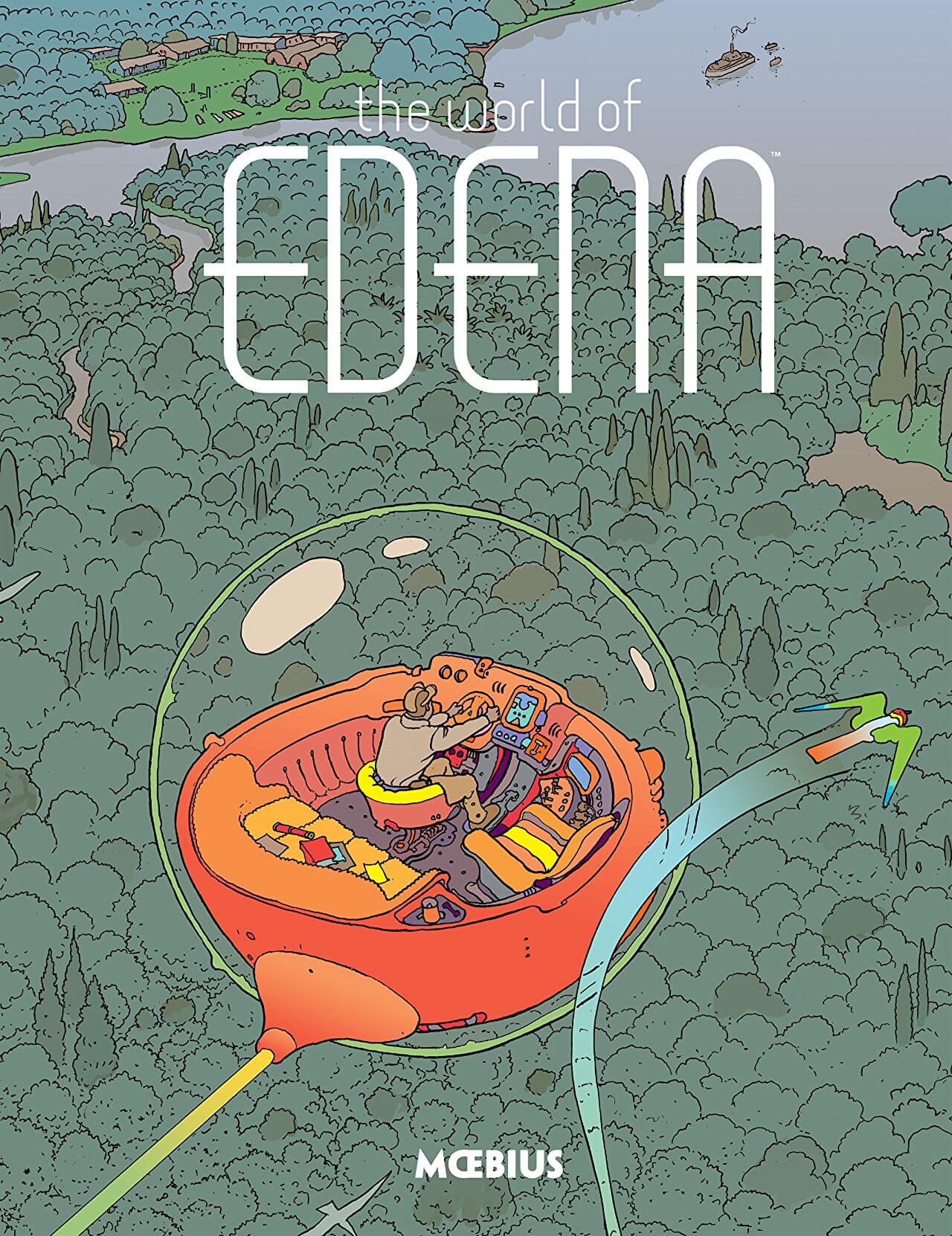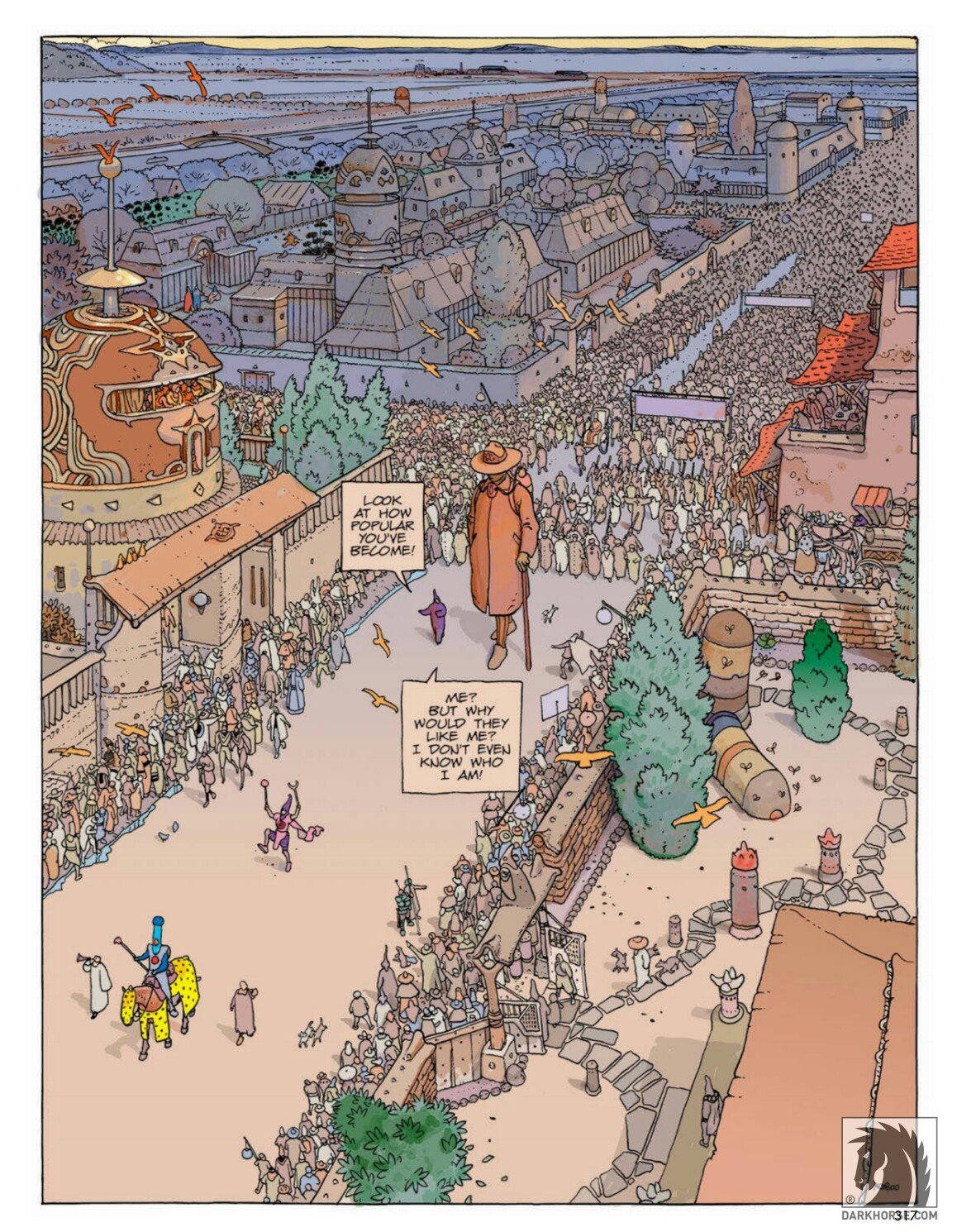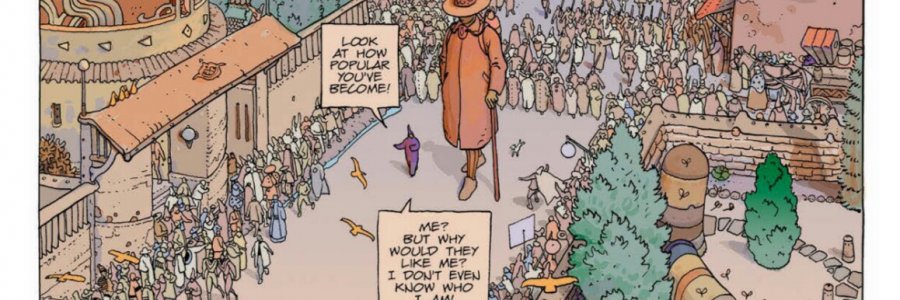Note: This graphic novel contains non-sexual full frontal and rear male and female nudity, rare graphic violence, and occasional mild profanity.
Expanded from a Citroën advertisement to a psychedelic science fiction epic, The World of Edena collects a comic series by legendary French comic creator Mœbius into a single large hardback volume.
I suspect The World of Edena falls into that category of artistic work that readers either love or hate.

On one hand, Mœbius works at the height of his artistic power here. In making a big science fiction story with space travel, rocket ships, and ray guns, Mœbius's art always illustrates its setting with elegant grandeur. His worlds feel huge, space feels vast, and planets bustle with people, but his layouts never suffer from too much complexity. I always felt visually grounded, the artist leading my eye with the gentle but firm direction of the best tour guide. Mœbius keeps his lines clean but not antiseptic; he imbues his line work with a vitality common in the best of European comics.
The colorists favor bold, psychedelic hues, which perfectly complement Mœbius's style. Space vehicles generally feature cold blue or purple hues, with lush greens and yellows for planets. It feels a little too stark at times for my tastes, but every color looks like a deliberate artistic choice.
So it's a beautiful book, and if you like the European style of comic art -- lush but precise, talky but visual -- The World of Edena might be worth its price just for its artistic quality.
The story is another matter. Beginning with a simple, almost folksy tale of two good friends stranded on an empty world, the story soon explodes into a massive epic. But instead of just making a plot-oriented space opera, Mœbius balances his big plot with a spiritual journey.
Basically, cross The Fifth Element with an LSD-trip-inspired New Age speech about the oneness of humanity, and you've got the fundamentals of The World of Edena.
Which is not to say that the story lacks any depth. Mœbius uses some clever imagery and plot twists to illustrate his points.
For example, we start with our (apparently male, but we'll get to that) protagonists, Stel and Atan. In the prologue, they're presented as troubleshooters/repair folks, but in the opening chapter Atan describes them as entertainers. It doesn't really matter, which itself becomes a recurring theme.
They become stranded on a planet, them stumble on an inscrutable alien artifact, which proceeds to repeat the monolith's playbook from 2001: A Space Odyssey. It sends Stel and Atan to a new environment on a journey of self-discovery.
In this new environment, they realize they are completely cut off from standard human civilization, including the drugs and technology that keep all humans sexless and healthy. Note that this rather important fact about humanity isn't mentioned until this point, 90 pages into Edena's 350 (so, over a quarter of the way in).
At this point, the characters find a pond, strip off their clothes, and take a bath, whereupon they realize that Stel is male and Atan female, and their secondary sexual characteristics are growing increasingly pronounced. Within one page, Stel becomes horny, then attempts to rape Atan, who runs and ends up whacking Stel on the head with a rock to make him stop.
I will also point out that the sizes of Atan's breasts grow from flat to B-cups, then shrink back to A-cups over the course of two pages and about 10 minutes of in-world time. It's a little thing, but it stands out, especially as the growth of her feminine features is a major plot point. Either Mœbius didn't notice, or it's intentional as she uses violence to solve a problem and it makes her more male. The latter of which seems weird and sexist.
In any event, Stel and Atan now separate and we spend much of the rest of the novel with Stel as he searches for Atan, and this question of the importance of human gender is never brought up again.

This, sadly, becomes a pattern. Mœbius spends much of his remaining pages telling adventure stories in strange alien cultures, a la The Fifth Element or Valerian, occasionally sidetracking into dream sequences as he explores philosophical themes about the best way for humans to live. He introduces us to a civilization so paranoid about disease that everyone wears colored hazmat suits at all times; seeing a person without their suit on is like seeing their genitals, generally a moment of revulsion. And while this is played for comedy and one or two lectures about shame, Mœbius never explores this in any depth. It's a funny quirk that we're supposed to laugh at or shake our heads at, not an honest perspective.
On the one hand, Mœbius does occasionally use interesting visuals and story themes, like gendered dimorphism as a thing avoided in the future and the idea of technology subsuming us.
On the other, Mœbius is mostly heavy-handed with this and lays on his symobls with a trowel. Naked innocent beings who live in the wilderness are pure and to be protected; technology and complex civilization are deranged and deserve destruction. Basically, we should all be John Lennon and Give Peace a Chance, Man. And this is presented as a flatly obvious stance. Nobody seriously argues about any of the advantages of civilization, not to mention the fact that the much-vaunted greater human evolution of this story is made possible by advances in human civilization. Without space ships, Stel and Atan couldn't have met the advanced alien artifact.
Unfortunately, the antagonist is always portrayed as a buffoon, as obviously wrong. That's no more clever than a propaganda film.
Still, The World of Edena is a beautiful sci-fi adventure with clear, occasionally startling imagery and a few ideas that should at least get the mind working, if just in reaction to Mœbius's philosophical stances. And if I'm honest, that's exactly the sort of thing I want in fiction: Something that provokes an intellectual response. The World of Edena accomplishes that with grace and beauty.

![[Atom feed]](/user/themes/geek-archaeology/images/atom-feed.png)
![[RSS feed]](/user/themes/geek-archaeology/images/rss-feed.png)
![[iTunes podcast feed]](/user/themes/geek-archaeology/images/itunes-feed.png)